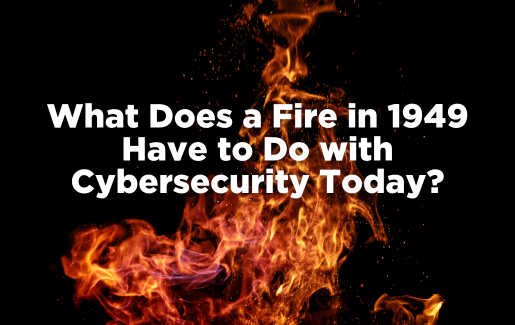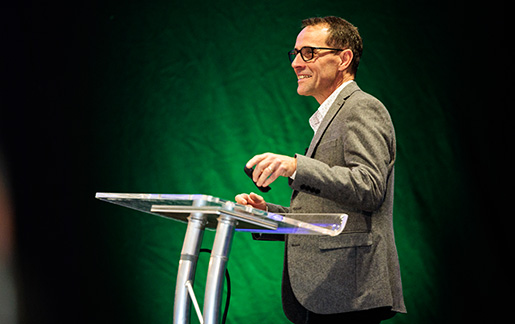
On Aug. 5, 1949, lightning struck deep in a gulch along the upper Missouri River in Montana on Aug. 5, 1949, igniting the surrounding grass and trees. The U.S. Forest Service parachuted in 15 specially trained firefighters, with a plan to direct the fire toward the Missouri River and create an escape route for themselves. But it had been a hot, dry summer and the wildfire spread rapidly and the men were soon trapped by 30-foot-high flames. Only three of the 15 survived, thanks to a foreman who created a brush fire that allowed the main fire to pass them by.
The incident led to a number of investigations, new firefighting techniques and safety measures for fire suppression—including the “escape fire” technique used by the foreman. The lessons learned have also been used for decades to demonstrate quick thinking, preparations and thinking outside the box to solve a problem.
The blaze can even serve as inspiration for battling the latest cybersecurity threats, according to Mostyn Thomas, senior director of security, EMEA, at Pax8. Thomas will discuss the parallels between the Mann Gulch fire and cybersecurity during a presentation during a CompTIA Community – Benelux meeting 22 May in Utrecht in the Netherlands. We asked Thomas what lessons MSPs should take from a 75-year-old fire 7,500 kilometers away. Here’s what he had to say.
How did you learn about the Mann Gulch fire?
I was reading a book during the pandemic called the Premonition by Michael Lewis and it was all about how the whole testing system for COVID-19 was built and had they thought about it before and can we learn about things from the past. The Mann Gulch fire was an example where lessons were learned. As my mind was listening to it, I thought there were a lot of parallels in cybersecurity that correlate to how we react to things today.
How does that fire correlate to cybersecurity today?
There have been so many pieces written about it, a film about it, studies, modern management techniques, loads of psychological theories, etc. One of the more basic lessons is that sometimes answers are in front of you, and you just have to think slightly differently. The firefighter was thinking “I’m going to die on this ridge unless I trust my gut. He created the safety fire and that’s a modern thing now. It’s similar to backups, disaster recovery, business continuity. I think overall, we as an industry do good things. but many people are not setting their “safety fires,” so to speak. After a cyber incident, they think, “If only I had backed up. If only I had done these things, had proper endpoint security I wouldn’t have a Ransomware screen in front of me.” His team didn’t come up with a plan because of the way the management structure was set up. That is very relevant to tech teams. We’re in a “fire situation” a lot of time and the key to avoiding that is planning.”
What’s the biggest lesson MSPs should learn?
 The Mann Gulch fire is a brilliant example to learn from but there are many others too. You could come up with five lessons just from the financial crisis and Lehman Brothers around being really honest about risk in your business. Just be honest and know that you might not be able to fix something today but know that it’s there. Lehman Brothers knew they had this massive valuation, but could they sell it for that? When the crunch came, they had a seminal moment really in that they were so overvalued.
The Mann Gulch fire is a brilliant example to learn from but there are many others too. You could come up with five lessons just from the financial crisis and Lehman Brothers around being really honest about risk in your business. Just be honest and know that you might not be able to fix something today but know that it’s there. Lehman Brothers knew they had this massive valuation, but could they sell it for that? When the crunch came, they had a seminal moment really in that they were so overvalued.
Be realistic and honest—in cybersecurity as well. Quite often we have to face reality of what’s our risk, where are we going, what are we doing. It sounds simple, but time after time we see accounts of what took place and we think I can’t believe they did that. For small and medium sized businesses it’s even more impactful because they haven’t got the resources to recover, unlike larger organisations. Most Small businesses are connected in complex supply chains with many other similar businesses and the risks are amplified many times. Do the basics, know your risk as well as your customers’ and suppliers’ risks. Make a plan and learn it. Many MSPs have historically implemented Backup, DR, Physical security measures, but are struggling to get cybersecurity correct in their own business and their clients.
What’s the biggest misconception MSPs have about cybersecurity today?
The biggest misconception is that cybersecurity is too difficult to achieve or learn about and implement in your MSP. The truth is that you can learn the basics and do them well quite easily and this is proved to be at least 80% effective against cyber-attacks. Putting some time aside to learn the basics, look at threat intelligence and network with peers that are doing cybersecurity will quickly enable any MSP to get proficient in cyber security. Being part of the right community is really important here.
How can MSPs help educate (and convince) customers about the importance of cybersecurity?
Selling cybersecurity services is different to selling support. You cannot sell on fear, uncertainty and doubt. You must understand your client and what their risk is. From here you can craft a solution that will reduce this risk. Back this up with examples of organisations that have been compromised in the locality or in the same industry, so that your client can identify with them. I think the key is then keeping the conversation going, as we don’t know what new risks are around the corner but you’re giving them every opportunity to plan and prepare.
Raise Your Cyber Awareness.
Learn more about earning the CompTIA Cybersecurity Trustmark.

 Add CompTIA to your favorite RSS reader
Add CompTIA to your favorite RSS reader

